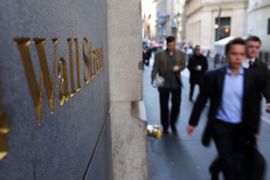Obama signs finance reform into law
US president says act will create the strongest financial protections for US consumers.

‘Innovation’
“This reform will help foster innovation, not hamper it,” Obama said.
“It’s designed to make sure that everyone follows the same set of rules, so that firms compete on price and quality, not tricks and traps. It demands accountability and responsibility from everyone.”
| In depth |
|
|
The senate last week gave final approval to tighten rules on Wall Street and across the financial industry in an effort to avoid a repeat of the 2007-2009 financial crisis.
Obama said the bill will rein in a culture of greedy risk-taking and “shadowy deals” that triggered the financial crisis.
But his opponents argue that the legislation punishes the whole banking industry for the excesses of the few.
It is, they say, another example of government intervention in the economy and could impede growth.
The new bill aims to usher in a new era of consumer protections and banking restrictions, representing a major legislative victory for Obama ahead of Congressional elections in November.
James Henry, an economist and author, said “when we look at this legislation the more we feel it’s like being invited to dinner”.
“It is a massive bill – 2,319 pages – it’s 10 times the length of the 1933 Banking Act,” he told Al Jazeera.
“It sets up so many different initiatives and defers so much power to regulators that we don’t know for years what its impact is.
“It requires 243 rule makings, 68 special studies and so it’s a kind of a black box.”
‘Central problem’
Henry said the bill provides for a consumer financial protection agency but added that the Federal Reserve “already has such a bureau and failed to do the job”.
“The central problem here is that this bill does nothing to adress key problems that we face. One is systemic non-disclosure by Wall Street of what their securities are really worth,” he said.
|
Timothy Ryan tells Al Jazeera about his struggles to make ends meet |
The signing ceremony featured a long list of supporters of the legislation.
The law assembles a powerful council of regulators to be on the lookout for risks across the finance system and creates a new agency to guard consumers in their financial transactions.
It places shadow financial markets that previously escaped the oversight of regulators under new scrutiny and gives the government new powers to break up companies that threaten the economy.
Large, failing financial institutions would be liquidated and the costs assessed on their surviving peers.
Borrowers will be protected from hidden fees and abusive terms, but also will have to provide evidence that they can repay their loans. The Federal Reserve will get new powers while at the same time coming under expanded congressional oversight.
Obama is going out of his way to spotlight the legislation’s creation of a consumer protection bureau, an effort to make an otherwise arcane and complex regulatory bill meaningful to the public and to fend off Republican criticism that it amounts to an expansion of government.
Contentious remnant
“These reforms represent the strongest consumer financial protections in history,” the president said.
“And these protections will be enforced by a new consumer watchdog with just one job: looking out for people – not big banks, not lenders, not investment houses in the financial system.”
While the bill represents the end of a year’s work by congress and the administration, Obama has at least one contentious remnant from the bill to address.
He must still nominate a director to the independent consumer protection bureau, an agency that became one of the bill’s flashpoints and was attacked by Republicans as a broad expansion of government power over private business.

